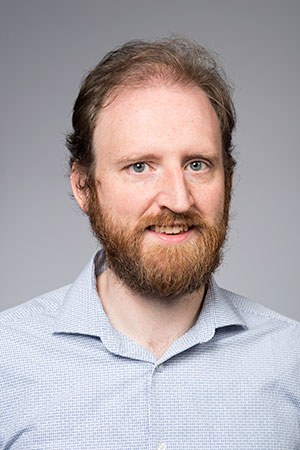Professor Renninger receives CAREER and RO1 awards
February 4, 2020

William Renninger, assistant professor of optics, has been awarded a prestigious National Science Foundation CAREER award and an RO1 award from the National Institutes of Health.
Renninger’s CAREER award will support his research in coupling light waves and acoustic waves for optomechanical applications – such as improving the performance of radio-frequency signal processors in the near term, opening up new possibilities for controlling quantum information in the future, and perhaps even enabling the detection of dark matter.
One goal of his award, for example, is to explore how acoustic waves could improve the filters used for controlling radio-frequency information carried in optical fibers, increasing the resolution of the information transmitted, and the speed and efficiency of doing so.
The award also includes funding to create open source access to information for designing and creating advanced lasers sources generating femtosecond pulses, which are essential tools for time-resolved measurements, biomedical imaging, optogenetics, spectroscopy, distance measurements and more. Renninger, an expert in creating sources for femtosecond lasers, says “there are now commercial products, but they’re very expensive. They are prohibitive for many research groups with limited budgets for equipment.”
Much of the cost is for expertise, not components, so his group will use part of the CAREER funding to provide consulting for research groups at smaller universities in how to design and build femtosecond lasers for basic research.
“The ultimate goal is to have a design guide published on our website for everybody,” Renninger says.
Deep brain imaging
In order to better understand human brain functions, researchers need to image individual neurons and their processes. Imaging deep in the brain is hindered, however, when the light waves are scattered and absorbed by the intervening tissues.
Renninger’s NIH R01 grant will enable him to pursue ways of improving three photon imaging, considered one of the most promising techniques for deep brain imaging.
Renninger will collaborate with Chris Xu, a Cornell University professor of applied and engineering physics, and director of Cornell Neurotech – Engineering and Cornell NeuroNex Hub. Xu is one of the pioneers of three-photon imaging.
Specifically, they will work on new devices to convert commonly available 1 micron wavelength lasers to the 1.3 micron wavelength that is best for three photon deep brain imaging with high-energy femtosecond laser pulses. This will save costs compared to the equipment now used.
They will also incorporate a new technique Xu has developed to make three photon imaging more effective. Currently many of the laser pulses miss the neurons researchers are trying to illuminate. Xu’s new technique times the pulses so they are emitted only when they’re expected to hit a neuron.
The more versatile, effective three photon imaging techniques they plan to create could be applied in many areas of research, not just deep brain imaging.
“Basically, every application that uses a femtosecond laser is limited to whatever particular period of pulse, energy level, and color a company offers with a particular product,” Renninger says. “We’re making sources that, in principal, can be at any color, with any pulse period and pattern, with high energies.”
Renninger received his BS and PhD degrees in Applied Physics from Cornell University. Before joining the Institute of Optics at the University of Rochester he was a Postdoctoral Associate and an Associate Research Scientist in the Department of Applied Physics at Yale University.
